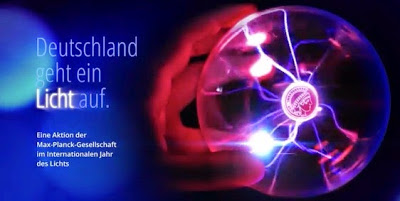| Online: | |
| Visits: | |
| Stories: |

| Story Views | |
| Now: | |
| Last Hour: | |
| Last 24 Hours: | |
| Total: | |
Yes, but what IS light?
By Brian Clegg
Thanks to Sabine Hossenfelder for drawing to my attention the little video below, asking people (in Germany) what light is. As a physicist, she was disappointed that most people don't realise that their idea of light was wrong. But as a science communicator, I find it neither disappointing nor surprising. Let's unpick that.
Is it surprising? Well no, not really. Although there might be passing mentions of photons at school, on the whole light is still solidly presented as a wave, certainly in the UK national curriculum. So I wouldn't at all be surprise by people saying it was waves. Equally I wouldn't be at all surprised by people saying particles thanks to popular science, or, for that matter, saying that they hadn't got a clue.
As for disappointed, I really don't think we can be, because of the way scientists use words, something I'll come back to in a moment.
I ought to clarify that arguably the best answer is that light is light. It isn't any of these things. We can usefully model light as a wave, a particle or an excitation in a field, but all of these are just models that help us understand and predict light's behaviour. Even scientists often struggle to remember that this is the case. And it's arguably impossible to explicitly say that this is the case all the time, because it does become very clumsy, qualifying what you say in every instance.
However if we are to use such a shorthand – and the same goes for lots of other such 'not really true' science statements like 'a quantum particle can be in more than one place at a time' or 'X% of the universe is dark matter' – it is important that somewhere in the article or book there is a disclaimer that explains the shorthand being used, and this is something both working scientists and science writers don't do enough. Which is why, if we are truly to be disappointed, we should probably be disappointed with scientists and science communicators, not the poor old public.
Here's the video in question. You don't have to speak German to get the gist, but it's useful to know that ein Teilchen is a particle and eine Welle is a wave.
Now Appearing is the blog of science writer Brian Clegg (www.brianclegg.net), author of Inflight Science, Before the Big Bang and The God Effect.
Source: http://brianclegg.blogspot.com/2015/05/yes-but-what-is-light.html




